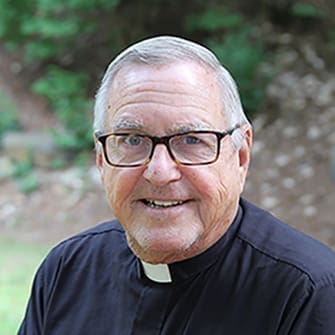The gift of the ‘Spiritual Exercises’ of St. Ignatius of Loyola
By Father Peter E. Fink, SJ, Commentary | Published May 28, 2020
St. Ignatius Loyola, the founder of the Society of Jesus (the Jesuits), left to the church fruit of his own spiritual journey as the “Spiritual Exercises.” Many ask, how do the exercises advance our understanding of Jesus as human and Divine—and his call to us?

Father Peter E. Fink, SJ
There are many translated texts of the Spiritual Exercises, but the text is not the true fruit. The text is meant to be used with a spiritual director, who over many weeks and months of conversation, helps you contemplate your life’s path in relation to God’s love. The Exercises are organized as “weeks,” which are “phases” that often require more than seven days in contemplation.
The first week reflects on sin: the sin of the angels, the sin of humanity and your own particular sin. It is done with eyes on the cross—the love that brings salvation. “Greater love than this no one has, that he lay down his life for his friends.” (John 15:13)
Author, Father William A. Barry, SJ, observed that the person on retreat confronts sin in light of this love of Christ on the cross. A first desire is to be without sin, but you realize you cannot be. So, the grace: “I do not have to be without sin; God loves and desires me as I am.” You come to know you can approach God as you are. That is the freedom of the first week.
The second week is about discipleship. With a foundation of gratitude and acceptance for being as we are, we spend time with Jesus, contemplating his public life.
Here is the invitation to follow Christ. How far and to what extent will I follow him? Three key questions: what have I done for Christ; what am I doing for Christ; what will I do for Christ? Offered are three ways of assessing that call and one’s own humility. How can we be faithful to the Lord at any cost?
This is both exciting and naturally filled with caution. You know that Jesus will be opposed, but that issue is a key meditation: do I follow Christ or the evil one? How far will I follow him? The grace of this second week is the commitment to follow Jesus, regardless of where he leads.
The third week takes us to Jesus’ Passion: the journey from Palm Sunday to the final gasp on the cross. This is a difficult week to enter. Of course, one could continue as in the second week—seeing the Passion as part of discipleship—but now we’re invited to feel his doubt, his sense of failure, his puzzlement. At the same time, we begin to feel his hope and conviction God will deliver. Only to the extent one knows this pain, will the promise of salvation—unveiled in the fourth week—be exciting, astounding and liberating.
So, the fourth week. It is about the resurrection. Contemplations include a visit of Jesus to his Mother and his various resurrection appearances with a focus on the Spirit to guide it. This too could be seen in the mode of discipleship, but at its depth, will bring you into the freedom of living as a beloved, hopeful child of God.
That is a first look at the gift of the Spiritual Exercises by St. Ignatius. Other gifts include the practice of a Daily Examen and spiritual retreats to realign our path toward God. Future columns will reflect on how the Ignatian legacy continues to be useful today to guide our own spiritual journey, professional choices and earthly relationships.
Father Peter E. Fink, SJ, is a retreat director at Ignatius House Jesuit Retreat Center in Atlanta.